|
|
|
Sort Order |
|
|
|
Items / Page
|
|
|
|
|
|
|
| Srl | Item |
| 1 |
ID:
101377
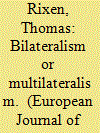

|
|
|
|
|
| Publication |
2010.
|
| Summary/Abstract |
Why do states cooperate bilaterally or multilaterally? This article addresses the issue using the example of international double tax avoidance. It is argued that double tax avoidance exhibits the strategic structure of a coordination game with a distributive conflict. The distribution of tax revenues depends on the asymmetry of investment flows between treaty partners. Since investment flows are defined dyadically, bilateral bargaining can best accommodate countries' concerns for the distribution of tax revenues and other economic benefits connected to the tax base. Moreover, because there are no serious externality problems with bilateral agreement, this solution is also viable. At the same time, there is a need for a multilateral organization to disseminate information and shared practices in the form of a model convention that provides a focal point for bilateral negotiations. This solution minimizes transaction costs. Since agreements are self-enforcing in coordination games there is no need for third-party enforcement. Instead, the Mutual Agreement Procedure (MAP) is a device to address problems of incomplete contracting.
|
|
|
|
|
|
|
|
|
|
|
|
|
|
|
|
| 2 |
ID:
130586


|
|
|
|
|
| Publication |
2014.
|
| Summary/Abstract |
The prevailing discourse on the Chinese state and its state enterprises is dominated by the application of Western political and economic concepts to China. These concepts ignore China's cultural and political history in which the state plays a major role and is embedded in Chinese society, as well as the role of numerous reform experiments during China's economic transition from a command to a socialist market economy. As a result, most assessments of Chinese state enterprises are unbalanced. The preoccupation with a state-private dichotomy has also led to the failure of recognising the emergence of a distinct corporate entity
|
|
|
|
|
|
|
|
|
|
|
|
|
|
|
|
| 3 |
ID:
149428
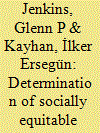

|
|
|
|
|
| Summary/Abstract |
In toll-road projects there is exogenous demand risk. Thus, the government may be required to provide a minimum-traffic guarantee to induce potential private partners to participate. The government must offer the most appropriate level of guarantee while also justifying this controversial fiscal policy tool to society. This study demonstrates the use of financial modeling, risk analysis, and economic evaluation in a toll-road project in Turkey, contributing to the narrowing of a capacity gap in the field. One criterion is proposed to produce a socially equitable guarantee level. This case study exemplifies the policy implications discussed in the conclusions, with a critical look at the public–private partnerships within the context of the neoliberal economic development theory.
|
|
|
|
|
|
|
|
|
|
|
|
|
|
|
|
| 4 |
ID:
088897


|
|
|
|
|
| Publication |
2009.
|
| Summary/Abstract |
The authors present an alternative to power resource theory as an approach to the study of distribution and redistribution. While they agree that partisanship and union power are important, they argue that both are endogenous to more fundamental differences in the organization of capitalist democracies. specifically, center-left governments result from pr consensus political systems (as opposed to majoritarian systems), while strong unions have their origins in coordinated (as opposed to liberal) capitalism. These differences in political representation and in the organization of production developed jointly in the early twentieth century and explain the cross-national pattern of distribution and redistribution. The clusters have their origins in two distinct political economic conditions in the second half of the nineteenth century: one in which locally coordinated economies were coupled with strong guild traditions and heavy investment in cospecific assets and one in which market-based economies were coupled with liberal states and more mobile assets.
|
|
|
|
|
|
|
|
|
|
|
|
|
|
|
|
| 5 |
ID:
111317


|
|
|
|
|
| Publication |
2012.
|
| Summary/Abstract |
This paper1 takes as its starting point the observation that fuel prices - and thus taxes - are important for good management of climate change and other environmental problems. To economists this should be no surprise yet it seems that the role of fuel taxation as an instrument of climate policy has not been fully appreciated. It is however one of the few policy instruments that, since several decades, has actually reduced fuel consumption appreciably. Thanks to taxation (mainly in Europe and Japan), carbon emissions are considerably lower than they would have been otherwise. In future where carbon emissions are to be cut drastically, this instrument will be crucial. There is however much opposition to the instrument. This opposition uses various arguments, for instance that fuel taxes hurt the poor since they are strongly regressive. We however find that the choice of country and methodology turns out to be of great consequence. We study seven European countries-France, Germany, United Kingdom, Italy, Serbia, Spain and Sweden and do find some evidence of regressivity but the evidence is very weak. It does not apply when lifetime income is used and it does not apply to the poorest country in the group. The best one-line summary is probably that the tax is approximately proportional.
|
|
|
|
|
|
|
|
|
|
|
|
|
|
|
|
| 6 |
ID:
166536
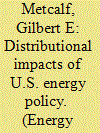

|
|
|
|
|
| Summary/Abstract |
This paper surveys energy policy in the United States from a distributional perspective. Focusing on the distributional impacts of energy taxes is too narrow a framework. The United States relies much more heavily on regulation than taxation to address energy-related market failures. It argues that most regulatory policies and tax subsidies to achieve energy policy goals are regressive. This includes fuel economy standards, EV purchase incentives, and energy efficiency tax incentives. In contrast, a carbon tax is likely to be progressive, even when ignoring the use of revenue. The view that carbon taxes are regressive stems from an incomplete distributional analysis that assumes all impacts arise from increases in the costs of consumer goods and services. Recent analyses have emphasized the importance of impacts on sources of income. In particular, a carbon tax is likely to reduce returns to capital more than wages. With capital disproportionately held by higher income households, this differential factor income effect is progressive. In addition, transfer income, more important for lower income households, tends to be indexed and so contributes to a carbon tax's progressivity. How carbon tax revenue is used can add even greater progressivity to a carbon tax reform.
|
|
|
|
|
|
|
|
|
|
|
|
|
|
|
|
| 7 |
ID:
160848


|
|
|
|
|
| Summary/Abstract |
In the run-up to parliamentary elections in Mongolia, it is not uncommon for aspiring political candidates to distribute things like noodles, calendars and cash to citizens. Although the practice is prohibited, it continues to thrive under different guises. This article examines electoral gifting in Uvs, Mongolia, before the 2016 parliamentary election. Drawing on ethnography, it suggests that gifts provide citizens a tool to evaluate candidates while also affording candidates the opportunity to make aspects of themselves known publicly, often through the giving of items that express their economic acumen and business success. It reveals entanglements between politics and the economy, whereby the electioneering landscape is skewed in favour of individuals who can demonstrate that they are either a ‘big person’ who embodies access to wealth, or someone who has the ability to ‘do things’ to generate wealth. Instead of seeing gifting through the prism of democratic ideals, the article argues that the practice operates within culturally specific responsibilities and obligations.
|
|
|
|
|
|
|
|
|
|
|
|
|
|
|
|
| 8 |
ID:
130971
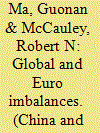

|
|
|
|
|
| Publication |
2014.
|
| Summary/Abstract |
We analyze global and euro area imbalances by focusing on China and Germany as large surplus and creditor countries. In the 2000s, domestic reforms expanded the effective labor force, restrained wages, shifted income toward profits and increased corporate saving. As a result, the Chinese and German current account surpluses widened, and that of Germany has proven more persistent, with subdued domestic investment. China is an early-stage creditor, holding a short equity position and a long position in safe debt. Germany's balanced net debt and equity claims mark it as a mature creditor that provides insurance to the rest of the world. China pays to lay off equity risk, while Germany, by contrast, harvests a moderate yield on its net claims. In both economies, the shortfall of the net international investment position from cumulated current account surpluses arises from exchange rate changes, asymmetric valuation gains, and, in Germany's case, credit losses.
|
|
|
|
|
|
|
|
|
|
|
|
|
|
|
|
| 9 |
ID:
175740


|
|
|
|
|
| Summary/Abstract |
The study addresses the question of whether there is a global pattern of terror organization (TO) lifespan. Based on two datasets which include hundreds of organizations, we show that there is a global statistical law of TO lifespan distribution. This distribution describes populations of TOs in different contexts of periods, geographical locations, ideologies, etc. The data as a whole, as well as its subpopulations, seem to emerge from an exponential distribution, which is formulated as a mathematical model. This model enables the prediction of TOs’ global population decay rate. The findings were obtained by introducing a novel procedure, which formulates and validates this mathematical law for discrete empirical data. We suggest that human behavior generating informational cascades and a positive feedback loop, which influence the number of core members in a TO, may be the source of this global pattern.
|
|
|
|
|
|
|
|
|
|
|
|
|
|
|
|
| 10 |
ID:
166309


|
|
|
|
|
| Summary/Abstract |
Electric power distribution network charges have become a popular area of study for regulators, industry and academia. Increasing use of photovoltaics (PVs) and electric vehicles (EVs) by domestic customers has created concerns about the fairness of the current tariff structure. Proposing a tariff design, which will be cost reflective, transparent, sustainable, economically efficient is socially desirable. Wealth transfer through electricity distribution tariffs is a major concern for energy regulators. This paper aims to analyse the current distribution network tariffs faced by four main household customer groups in Great Britain (GB) - defined as those who own a PV and an EV, those with EV but no PV, those with PV but no EV and finally those with neither EV nor PV – under various uptake scenarios for EVs and PVs. We illustrate the impact on household tariffs for the most and least expensive GB network operators, namely London Power Networks and Scottish Hydro Electric Power Distribution. The results show that, due to the current network charges calculation structure, as PV penetration increases, the distribution tariffs increase for all customers regardless of whether someone owns a PV or not. On the other hand, as EV penetration increases, the distribution tariffs decrease for all customer groups. Another key finding is that the distribution tariffs in Great Britain are EV dominated and the future EV and PV penetration projections indicate that the distribution tariffs will likely decrease for all customers in Great Britain.
|
|
|
|
|
|
|
|
|
|
|
|
|
|
|
|
| 11 |
ID:
092858


|
|
|
|
|
| Publication |
2009.
|
| Summary/Abstract |
Most public policies, particularly those in the energy sphere, have not only efficiency but also distributional effects. However, there is a trade-off between modelling approaches suitable for calculating those impacts on the economy. For the former most of the studies have been conducted with general equilibrium models, whereas partial equilibrium models represent the main approach for distributional analysis. This paper proposes a methodology to simultaneously carry out an analysis of the distributional and efficiency consequences of changes in energy taxation. In order to do so, we have integrated a microeconomic household demand model and a computable general equilibrium model for the Spanish economy. We illustrate the advantages of this approach by simulating a revenue-neutral reform in Spanish indirect taxation, with a large increase of energy taxes that serve an environmental purpose. The results show that the reforms bring about significant efficiency and distributional effects, in some cases counterintuitive, and demonstrate the academic and social utility of this approximation
|
|
|
|
|
|
|
|
|
|
|
|
|
|
|
|
| 12 |
ID:
082905


|
|
|
|
|
| Publication |
2008.
|
| Summary/Abstract |
In 2005, the Indonesian government implemented a massive fuel price increase. While the benefits of the reform on efficiency grounds have been widely acknowledged, there is still debate about whether the reform was equitable. That question is answered in this paper using a Computable General Equilibrium (CGE) model with disaggregated households that allows for a rich and accurate distributional story. Analysis of various counter-factual scenarios analysis of the reform is carried out. It suggests that the reform could have been progressive if it increased only vehicle fuel prices. However, it tends to increase inequality especially in urban areas when the price of domestic fuel (kerosene) is also increased. Proper and effective compensation is important in mitigating the distributional cost or poverty impact of the reform. A uniform cash transfer to poor households that disregards poor households' heterogeneity tends to over-compensate the rural poor but under-compensate the urban poor.
|
|
|
|
|
|
|
|
|
|
|
|
|
|
|
|
| 13 |
ID:
137646
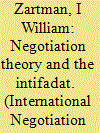

|
|
|
|
|
| Summary/Abstract |
The evolution of the Arab Spring in eight countries is primarily a matter of negotiation. The instances can be broken down into Short Track (Tunisia, Egypt) and Long Track (Syria, Libya, Yemen) Transitions and Short Track (Algeria, Morocco, Bahrain) Reactions. They bring a number of lessons for negotiation analysis, primarily on scope and power, and their deviation from an ideal type model can be explained by the predominance of distributive over integrative negotiation and the imposition of a three-dimensional scene for negotiation and legitimization, with an Islamic dimension overlaying the usual left-right spectrum.
|
|
|
|
|
|
|
|
|
|
|
|
|
|
|
|
| 14 |
ID:
152558
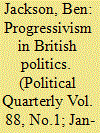

|
|
|
|
|
| Summary/Abstract |
This article argues that a return to the history of progressive political thought can help us to think afresh about what a renewed centre-left politics might look like today. The article identifies some significant aspects of this history that attracted little attention in earlier debates over the British progressive tradition—in particular, debates about social ownership, nationalism and distributism. This revisionist history of British progressivism points the way towards some common ideological ground that could provide a starting point for a new dialogue between different ‘progressive’ political parties and interests.
|
|
|
|
|
|
|
|
|
|
|
|
|
|
|
|
| 15 |
ID:
170804
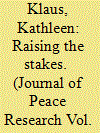

|
|
|
|
|
| Summary/Abstract |
How does large-scale land reform affect electoral stability and the prospects for election violence? While scholars have theorized elite-level logics of land distribution, few studies analyze the effects of land reform on the attitudes of ordinary citizens, and the implications such reforms have for electoral violence. The article uses an original survey and qualitative interviews in coastal Kenya to examine the effects of the Kenyan government’s recent land titling campaign, the most ambitious and extensive since independence. It theorizes and tests the micro-mechanisms through which the selective distribution of land rights in the pre-electoral period heightens or lowers the stakes of an electoral outcome by altering levels of political trust and perceived threat. Results indicate that title deed beneficiaries are more likely to trust political institutions than non-beneficiaries. Yet, while title deed recipients are more likely to trust state institutions, they are also more likely to fear the electoral process compared to non-beneficiaries. The findings reveal how the perceived stakes of an election can vary across local spaces. Where political trust is low and threat is high, citizens may view elections as particularly high-stakes events and, thus, may be more willing to take on the costs of participation in violence to ensure their preferred political outcome, or to defend themselves against anticipated attacks.
|
|
|
|
|
|
|
|
|
|
|
|
|
|
|
|
| 16 |
ID:
177556
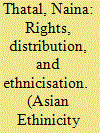

|
|
|
|
|
| Summary/Abstract |
‘Old Settlers’ is a name that people commonly known as ‘Marwari’ and others ‘Sikkimese of Indian origins’ have adopted for themselves following 2008 Amendment 26AAA, which exempted from income tax Sikkim Subject Certificate holders; ‘Sikkim Subject’ status was the form of citizenship granted during the monarchy, and it remained basis of access to citizenship rights after the inclusion of Sikkim into India in 1975. Whereas some of their families had settled in the nineteenth century, which would have qualified them for Sikkim Subject status, Marwaris living in Sikkim were not given this status. Why ‘old settlement’ became central to their claims after 2008? This paper analyses the emergence of label ‘old settlers’ as an outcome of the specific connection in Sikkim between formal recognition as an ethnic minority and distribution of state benefits, and of increased importance given to a territorial form of recognition after 1975.
|
|
|
|
|
|
|
|
|
|
|
|
|
|
|
|
| 17 |
ID:
152765


|
|
|
|
|
| Summary/Abstract |
Since the pioneering studies of Mandelbrot, a great deal of interest has arisen for the parameters of fractal finance theory. With this in mind, the present study attempts to examine the risk composition of S&P 500 index industries through panel data analysis. In the modelling of industries’ stock return risk, we use internal and external variables which are related to the companies’ financial ratios and stock market movements. In the first section (sigma-risk) of the study, we model the stock return risk through standard deviation, while in the second section (alpha-risk), the alpha parameter of stable distributions has been used for the same purpose. Panel data analysis results demonstrate that in the sigma-risk model for the healthcare industry, there is a significant internal variable (roa) that negatively affects the industry risk. However, for the alpha-risk model, some significant variables are obtained for the service industry. Another important finding is the changing level of market risk under the two models. While in the sigma-risk model, the magnitude of the market (external) risk variable is high, under the alpha-risk model, we have seen that market risk is relatively low despite the fact that it still has the highest effect on industry risk.
|
|
|
|
|
|
|
|
|
|
|
|
|
|
|
|
| 18 |
ID:
167094
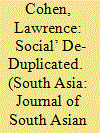

|
|
|
|
|
| Summary/Abstract |
India’s programme for biometric registration, Aadhaar, is organised through engineering concept work that depends upon three distinctive claims for the ‘social’ as human condition: (1) the social as ‘socialism’, the failed premise of Nehruvian decolonisation understood to have placed the poor into a condition of bare life; (2) the social-yet-to-come as the effect of a proper distribution of the good termed ‘service’, to bring the poor into a self-ameliorating form of life; and (3) the social as the affective entanglements that family, caste and religious ties of biography demand, ties that divert service from proper distribution. Within the concept-world of Aadhaar, such entanglements prevent the social-yet-to-come, demanding a form of government that can produce a political subject outside of biography, which for the engineers is achieved by conceiving of India as a database, an archive prone to the duplication of its elements, and thus governing India as one would govern a database: by continually ‘de-duplicating’ it.
|
|
|
|
|
|
|
|
|
|
|
|
|
|
|
|
| 19 |
ID:
163559


|
|
|
|
|
| Summary/Abstract |
This paper simulates the real household expenditure effects of large electricity price increases in Zambia. First, we find that electricity subsidies are highly regressive. The richest household quintile receives over 60% of the subsidies, while the poorest quintile receives less than 1%. Second, our partial equilibrium simulations of the welfare effects of a 75% electricity price increase show that the poorest households would experience a 3 times larger percentage loss in real expenditure compared to the wealthiest households. Naturally, these adverse effects lead to an increase in poverty. However, we find that transferring the fiscal savings realised from the complete elimination of electricity subsidies to the poor reduces extreme poverty significantly. This budget-neutral strategy is particularly attractive for Zambia, and other sub-Saharan economies currently battling the twin challenges of widening budget deficits and high extreme poverty.
|
|
|
|
|
|
|
|
|
|
|
|
|
|
|
|
|
|
|
|
|